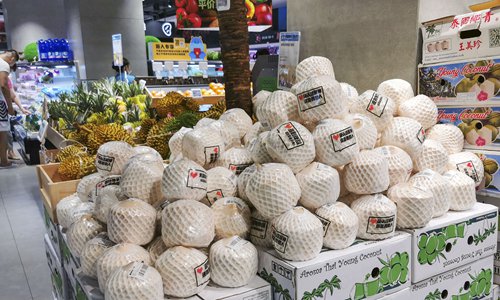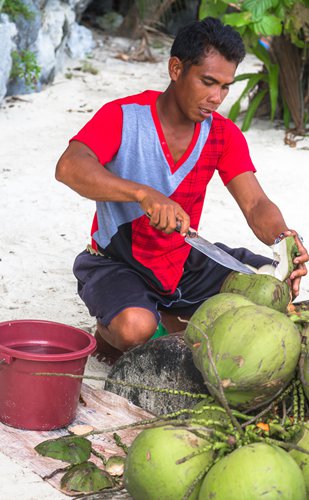Philippine coconuts fill Chinese stomachs
Domestic market has breathed new life into the Southeast Asian country’s fruit industry

Coconuts on sale in a Shanghai supermarket in June Photo: IC

A Filipino man cuts coconuts for customers in 2017. Photo: IC
John Tan has started shipping tons of aromatic young coconuts to China. Since its first shipment late last month, his company has shipped 108,000 young coconuts to the cities of Guangzhou, South China's Guangdong Province, and Xiamen, East China's Fujian Province.
"I am very, very happy that China granted us access to their market," Filipino coconut exporter Tan said, adding that exporters and coconut farmers stand to gain from a trade deal struck between Beijing and Manila.
Tan, president of Eng Seng Food Products, said the deal could breathe new life into the Philippine coconut industry, an important pillar of Philippine agriculture.
Tan is upbeat about breaking into the Chinese market. "That is why I did not waste time when I heard about the news that China has opened its market to Philippine coconuts. I jumped at the opportunity, and started looking for a Chinese buyer," he said.
Bilateral ties bear fruit
Indeed, trade agreements forged by the Philippine and Chinese governments are bearing fruit.
"With President (Rodrigo) Duterte's independent foreign policy, the relationship of the Philippines and China has grown warmer. Such benefits are now accruing to the trade and industry sector," the Philippines' Trade and Industry Secretary Ramon Lopez said.
Lopez also said that, "China's role has become very significant in our economy, given that they are now our top trading partner, our second foremost export market, and our number one import source."
While there is a perceived protectionist trend, Lopez said the fact remains that with the continuous development of new technologies, the fast-paced interface of economies, and a growing global market, international trade will remain a vital platform.
"Noting that in the conduct of trade, a stable and predictable business environment is preferred, the market will still adhere to a rules-based trading system," Lopez said.
Tan Qingsheng, the deputy chief of mission and minister counselor at the Chinese Embassy in the Philippines, said previously that the volume of bilateral trade between the Philippines and China reached $55.7 billion in 2018, with an 8.5 percent year-on-year increase.
"China is now the Philippines' top trading partner, the largest source of imports and the fourth largest export market," he told a Belt and Road Initiative forum last month.
Tan said that China has imported more than $2 billion of tropical fruits from the Philippines over the last two years.
He said China imported more than 1 million metric tons of bananas last year alone, and became the No.1 export market for Philippine bananas.

The town of Brooke's Point in the Philippines celebrates Coconut Tree Festival. Photo: IC
Tree of life
A recent report on the Philippine coconut industry states that coconuts remain one of the most important crops, and are a major export of the Philippines. An estimated 25 million Filipinos directly or indirectly depend on the coconut industry for their livelihood.
However, it also shows that despite the continued boon of coconut exports, there has been no significant improvement in the coconut industry in recent years, adding that the development of the coconut industry would mean significant improvement for the lives of millions of Filipino people.
"Coconut, also known as the 'tree of life,' is one of the most important crops in the Philippines. It is considered a major export, contributing 3.6 percent of the country's gross value-added in agriculture, next to banana, corn and rice. Indeed, the country remains to be a top producer and exporter of coconut worldwide," reads the report.
Former Agriculture Secretary Emmanuel Pinol said that the Philippines is ranked No. 2 in the world, with over 15 million metric tons of coconut produced every year from an area of about 3.5 million hectares.
Tan urged Filipino farmers to expand their aromatic variety of coconuts, as there is a huge market in China due to its distinct taste and aroma.
